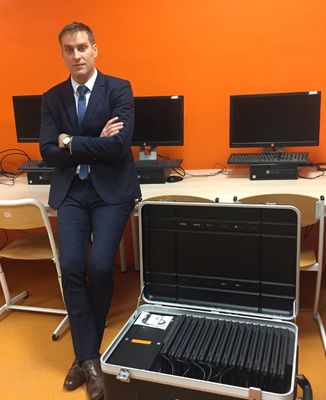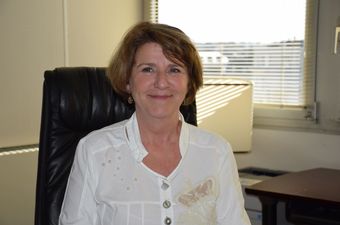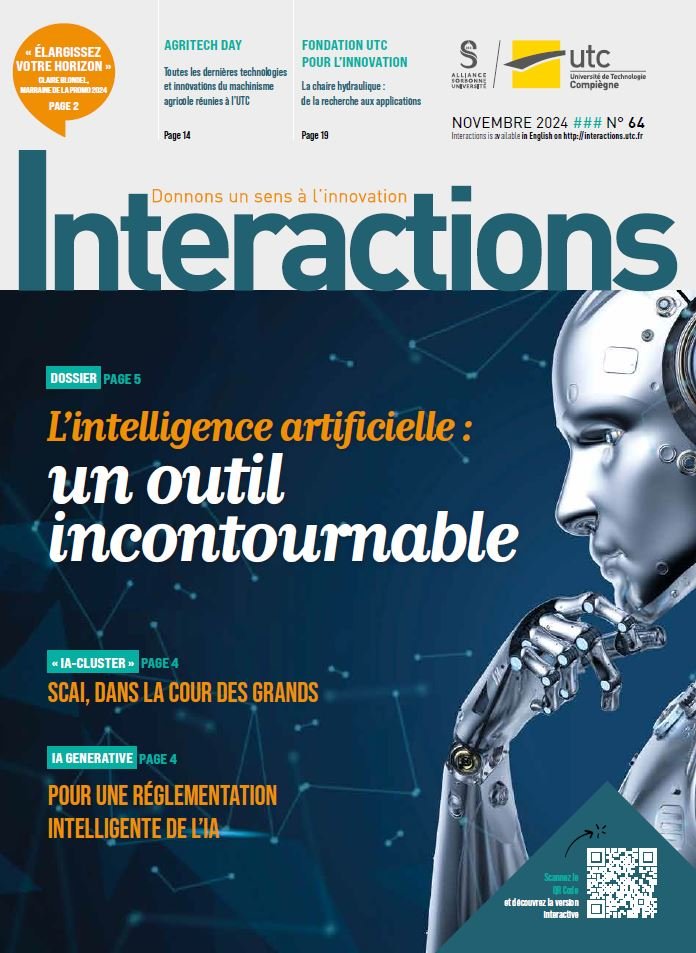What will teaching be like tomorrow?

Alongside the major technological changes, the way we educate our children and the way teachers intervene are changing too. The entire pedagogical relationship needs to be accompanied, if we are to successfully hand on knowledge and new life-style behaviours to the younger generations.
School is changing as the digital revolution progresses. The digital strategy implemented by the Amiens regional education authority covers several concrete priority thrusts in the policy to accompany changing pedagogical practice. “And to this end, we need to go out into the field, observe experimentations and provide for high-quality digital environments. Teachers today no longer intervene in the same way they did, say 20, 15 or even 10 years ago. We are now light-years away from those days”, says Emmanuelle Jacquier, the academic delegate for digitized education at the Amiens regional education authority, who in a sense, write the rules for training “in” and “by” digital techniques.
The teacher’s role in being transformed
For any teacher, the question of rethinking the way he/she teaches raises several questions in terms of class preparation work, learning methodologies and even new pedagogical strategies. “Since digital tools and techniques allows you change the school format which will be less and less face-to-face, or top-down, we need to help teachers as they modify their classroom practice. We do not intend to revolutionize uses, but rather to accompany the teacher teams from where they were — to progress and gradually but definitively integrate new pedagogical practice as offered by the digital world,” she adds.
Tools available
Computers, printers, i‑pads, robots, ENTs (see above) and interactive whiteboards are now available in every school, but it takes some 5 years ion average to really develop a really interactive utilization of the new tools. “Tools must meet needs, and not the other way round”, goes on to explain Emmanuelle Jacquier. “Our need is to educate/train students, the future citizens of the land. The tactile table Cre@tion used in collaborative work developed at UTCV is a very fine project, all the more so because one of the research scientists involved was able to assess the device. And this, indeed allows us to envisage evolving practice”. Co-operation group working, collaboration,… these are notions that encompass schools and the new learning processes. “With new ways to learn, teachers must now work further upstream from their classwork preps and, at the same time, must leave more time and ‘space’ to the students to enjoy monitored autonomy. This presupposes that we prepare the overarching framework. And this in turn leads to the question of how to assess students’ responses. The digital world allows for rapid answers too”, concludes the Delegate who foresees numerous advances that accrue through introducing digital techniques in today’s pedagogical changes.

EDUCATION, IN AND VIA DIGITAL TECHNIQUES
At the Jacques Monod Collège secondary school in Compiègne, the entire teaching community is involved in education in and with digital tools and techniques. Witness this vision offered by the Deputy Head Thomas Grados, 33 years old “Although we are not a pilot scheme school in the digital field, we did catch up very quickly. Our efforts began two years ago, when we received some language and music kits, then we made an assessment of our network capacity and since then have fully wired up the school. We set up a COPIL (steering committee), with a DANE (an academic delegate for digital education), our two ICT officers, plus “reps” from the territorial Department (Oise) and from students’ and parents’ associations. Today, we are launching a new digital educational scheme so that out students at Jacques Monod can follow a real course till such times as they move on to the lycée. The students are given primer courses on robotics, computer scene and even some software programming and for this they have full access to the digital techniques via various “apps” (Tactiléo, Padlet …) or document sharing and sourcing new skills and increased knowledge bases”.

3 QUESTIONS FOR… BÉATRICE CORMIER, RECTOR OF THER AMIENS REGIONAL EDUCATION AUTHORITY, CHANCELLOR OF THE UNIVERSITIES.
How do you see schools evolving in the digital revolution?
In a similar manner as all other Society sectors today, schools are being profoundly affected by ongoing digital changes, leading us to rethink all the classic, traditional bases of four organization and our pedagogy; course contents, resource and services. This evolution in methodologies also comes with a modified ‘working space’ for teachers: classrooms are being adapted to new approaches, with more parallel modularity. Digital work areas are being multiplied, thereby reinforcing and facilitating the connection between school and the student’s family. There appears to be one leitmotiv that sums ups perfectly the ongoing movement — to enhance and encourage all interaction’s that portend success for all students.
Teacher training in digital techniques seems a huge task: what is your vision for the Amiens Education Authority?
Teacher training here reveals several priority thrusts: coming to grips with the new equipment, diffusion and circulation of the new resources and development of new pedagogical utilizations. This later thrust is the most complex to implement, inasmuch as it often implies far-reaching changes in the way teachers teach. Consequently, what we propose are teacher training modules that are base on new school configurations and allow the teachers to experiment various added-values in terms of student motivation and the way they adopt the new technologies and knowledge sources coming ‘on line’. Training is no longer time-limited and takes the form of a long-range accompaniment, thus enabling response adapted to each teacher’s situation and needs. These training modules use then new equipment in a collaborative manner and even in virtual class configurations, with of course a set of face-to-face sessions. The objective assigned to training modules is to see the teaching staff become the key actors of their own adaptation. In parallel, we multiply exchanges among peer groups to enrich the largest number of participants possible via return and sharing of experience.
How are we to bring the better of two worlds together, combining paper & pencil and the digital, for children who know are already “digital natives”?
This is the real challenge of the ongoing evolution we are seeing in pedagogical, classroom, practice: to seek the best in each method, from the most traditional to the most modern and to vary experimentations to improve overall learning performance levels. Cognition sciences help us in this field: students learn all the belter as and when they adopt new knowledge, manipulate it and become actors themselves in their learning process. This way, schools represent mutually beneficial ground for paper-pencil and digital worlds to meet, Children are comforted in their position as ‘learners’ and we see ourselves as contributing to higher levels of self-confidence.




